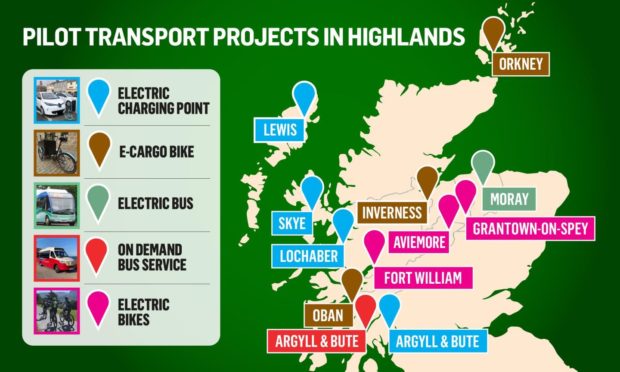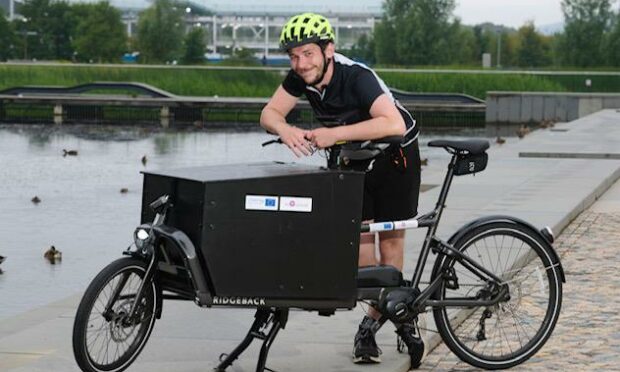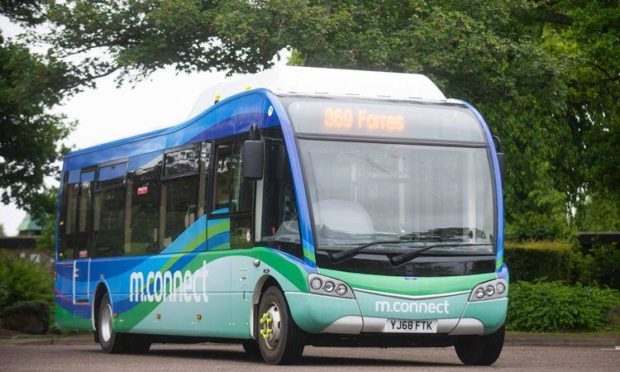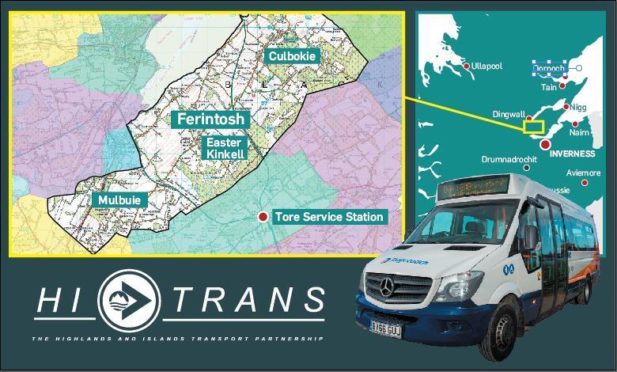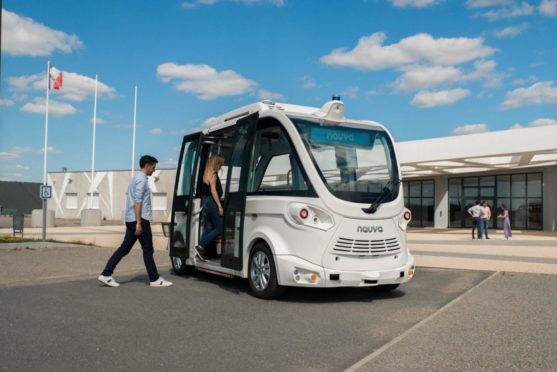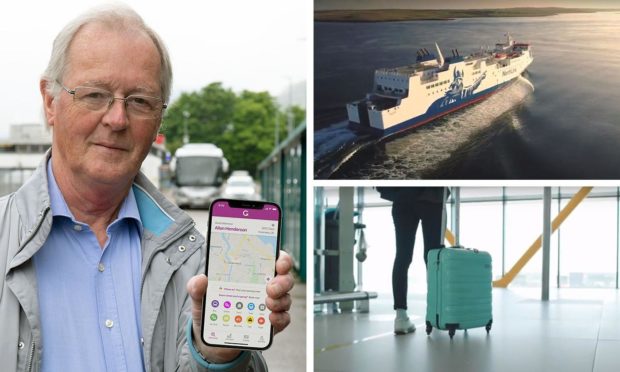Before the term was invented, eco-friendly bicycles were a common and efficient way for businesses to deliver goods.
A new project is going back to the future which could lead to bikes more regularly replacing delivery vans on busy streets.
An £80,000 trial with 12 electric cargo bikes has started in Inverness, Oban and Orkney as part of a shift towards a low carbon, sustainable environment.
£5m for transport pilot schemes
It is one example of a series of initiatives being trialled in the Highlands and Islands, giving a glimpse of what rural travel may look like in future.
Regional transport partnership Hitrans is involved in pilots which have attracted nearly £5m of European funds.
They involve trials of electric bikes and vehicles, a driverless bus, ground-breaking phone apps and on-demand transport services.
The aim is to make travel greener and more efficient for residents and visitors in more peripheral areas.
The e-cargo bikes project involves Laughing Tree Couriers, Velocity bike shop and café, High Life Highland and Prissy Queen of Desserts in Inverness.
The Hope Kitchen, Go Naked Veg and MacQueen Bros in Oban, and Act Now (Mid Argyll) and the Isles Coast and Countryside Trust in Lochgilphead are also taking part.
In Orkney, bikes are being trialled by Rousay, Egilsay and Wyre Community Council, Stronsay Development Trust, Sanday Community Council and Kirkwall Pier.
E-cargo bikes can save time and emissions
Matthew Lafferty, who runs Laughing Tree Couriers, aims to have a fleet of e-cargo bikes to increase capacity and serve a wider area.
He said: “It makes such a difference to getting about town. It also saves energy so you can work longer without getting so tired.
“With the city pushing towards more active travel and trying to get fewer cars in the centre, e-cargo bikes are one way of doing that.
“It’s quicker than using a van and people who get a delivery by bike are always positive about it.”
A report for the charity Possible estimated e-cargo bikes deliver about 60% quicker than vans in London.
They can also help save 133,300 tonnes of CO2 a year.
Jayne Golding, Hitrans projects and policy manager, said many businesses want to minimise carbon emissions.
Customers are also eager to support businesses that are local, smaller-scale and adopt positive business practices.
Pilot schemes can help towards sustainable environment
“E-cargo bikes fill the gap between traditional bicycles and delivery vans.
“They are a perfect option for transporting work equipment, light freight, parcels, groceries and prescriptions.”
Jayne, who leads Hitrans’ EU projects programme, said working on the European projects allows the region to share knowledge and expertise about transport challenges.
“Piloting new technologies and services allows us to share learning and best practice to work towards a more sustainable environment.”
What are the other projects?
The e-cargo bikes are part of Move – (mobility opportunities valuable to everybody) which runs until February.
It has also involved pilot projects with the Sleat Development Trust in Skye and in Ferintosh in the Black Isle carrying passengers by electric people carriers.
During the pandemic the vehicle was used to take goods around the community.
Under the Smart Cities project, which runs until next year, Hitrans and The Highland Council have installed 250 smart bus stops with QR codes and upgraded passenger information.
Future projects include connected car technology, allowing drivers to pick up information, including parking availability, via Bluetooth.
The GPaTRA (green passenger transport in rural areas) has piloted an electric rural bus service in Moray, in partnership with Moray Council.
An evaluation will be applied to other remote and rural areas looking to adopt a fully electric bus.
The project has also developed a business case for battery-powered trains between Wick and Thurso.
During lockdown it held pilots in Aviemore, Grantown and Fort William offering e-bikes to key workers on long-term loan.
They are now being used by visitors and residents swapping driving for cycling for trips to work, education, shopping, visiting and leisure.
Driverless bus
A trial of a driverless bus will be held at Inverness Campus next year under the PAV (planning for autonomous vehicles) scheme.
The autonomous shuttle service will be tested between the campus and the nearby retail park.
The project, delayed from this year, will see the vehicle carry six or 12 passengers.
Driverless vehicles are expected to be widespread in Europe by 2030. They use sensors and software to control, navigate and drive.
It is hoped eventually to bring the technology across the Highlands and Islands.
Hitrans is also working in partnership with Robert Gordon University to investigate a secondary pilot opportunity to test ‘connected vehicles’ in Orkney.
In addition, it hopes to revive plans in future for a driverless shuttle between a new railway station at Inverness Airport, the airport terminal and Tornagrain.
Stronger Combined, which continues next year, has piloted a ground-breaking phone app making it easier to plan, book and pay for travel.
The GO-HI app provides instant access to information on buses, trains, taxis, car hire, car clubs, bicycle hire, air travel and ferries.
Rapid electric car charging
The one-stop service gives travellers information to make greater use of public transport, car sharing and cycling.
Later this year Hitrans is also launching Hi-Bike, an electric bike loan scheme with 30 bikes spread across three hubs in Inverness.
The FASTER scheme, running until 2023, involves installing 24 rapid electric car charge points across Argyll & Bute, Western Isles, and Skye, Lochalsh & Lochaber areas.
It is part of a joint proposal across Scotland, Ireland, and Northern Ireland.
The modelling work will help prioritise future charge point locations.
Starting next year, the Smart Shared Green Mobility Hubs programme will develop electric mobility hubs in cities, linking to the GO-HI app.
Three hubs in and around Inverness will focus on shared e-bike hires, e-cargo bikes and electric car clubs and car charge points.
Helping achieve decarbonising targets
Ranald Robertson, Hitrans partnership director, said Hitrans’ involvement in the EU projects will help Scotland to reach Scottish Government targets to decarbonise transport.
“The significant investment brought to the Highlands and Islands by these projects helps to bring new services to the area that otherwise would not be possible.”
